
|
Greatest Courtroom Dramas 1920s - 1930s |
(chronological by film title) Introduction | 1920s-1930s | 1940s | 1950s | 1960s | 1970s | 1980s | 1990s | 2000s | 2010s |
(chronological by title) |
||
| Film Title/Year/Director/Length/Studio, Academy Awards, Brief Description | ||

|
The Passion Of Joan Of Arc (1928, Fr.) (aka La Passion de
Jeanne d'Arc) Shot mostly with close-ups (and a few medium shots) and in stark black and white (and high-contrast lighting), with dialogue (on inter-title cards) derived from the actual 500 year-old transcripts of French warrior heroine Joan's (Maria Falconetti) heresy trial. 19 year-old Joan, dressed as a young boy, had defeated the British occupation forces. She was captured by French loyal to the British, imprisoned, and brought to trial (bound in chains) before the Holy Office of cruel, tormenting, grotesque inquisitors (stern priests, prison guards and judges). She was charged with claiming divine guidance and heavenly visions for her military exploits. She was ridiculed, shouted at, beaten, tortured, and deceived. Joan was mocked and abused in prison, was given a fake crown to wear, and denied the Holy Sacrament. All the while, she was exhausted and agonized, yet clinging courageously and painfully to her faith (eventually with tears streaming down her face) without confessing to the charges. Verdict: Joan of Arc suffered through 29 cross-examinations (although they were combined into one inquisition in the film), combined with torture and head shaving, before she was found guilty and burned at the stake (with an uplifted, beatific face) in 1431. |
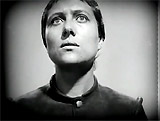
|

|
M (1931, Germany) Police in Berlin in the 1930s were unable to apprehend a kidnapper and pedophile serial killer of little girls. The 9th victim had just been found - Elsie Beckmann (Inge Landgut). Criminals in the underworld joined in the hunt, aided also by the beggars' association. Their first major tip was from a blind balloon peddler (Georg John) who heard a suspicious man whistling Edvard Grieg's "Hall of the Mountain King" from the 'Peer Gynt' Suite at the same time that the man bought a balloon (to lure the unsuspecting young female victim). The psychopath was identified as Hans Beckert (Peter Lorre) - his coat back was marked in chalk with the letter "M" by one of the beggars. Beckert was caught hiding in an attic, and taken to a large abandoned brewery building to stand trial, where he was questioned by a panel of underworld boss-leaders, headed by chief judge Schranker (Gustaf Gründgens). Verdict: During the kangaroo court hearing, Beckert groveled on the floor, expressed his terror through his bulging eyes, and confessed to his crimes, claiming that he was compelled by an evil voice and uncontrollable inner impulses to kill - and couldn't stop himself. Beckert's defense counsel (Rudolf Blümner) argued that the "insane" Beckert wasn't responsible for his actions, and should be turned over to police and the state - to institutionalize and/or cure him. Although the crowd urged Beckert to be eliminated, the police arrived and escorted him away before a decision was made. |
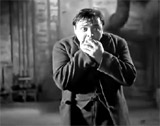
|
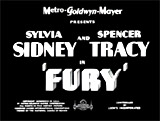
|
Fury (1936) Set during the Depression era, Joe Wilson (Spencer Tracy) was about to marry fiancee Katherine Grant (Sylvia Sidney) when he was arrested by Deputy Meyers (Walter Brennan) on suspicion of kidnapping. He was innocent, although apprehended for having in his possession a $5 bill from the ransom money. Wilson was jailed in the small midwestern town of Strand, where a brutal lynch mob attacked the jail and set it on fire, with Wilson inside and screaming for his life. Katherine fainted, unaware that Wilson escaped death and was determined to avenge his wrong with a frame-up. Wilson's two brothers spread the idea that the lynch mob should be tried for first-degree murder - and 22 townsfolk were indicted as defendants. Meanwhile, the real criminal kidnappers were caught, implying that Wilson was innocent all along. The case was tried by D.A. Adams (Walter Abel). In the trial, a newsreel proved that all of them were complicit and guilty of the crime - after they had given perjured testimony. One problem remained - Wilson's body was not recovered after the fire. Was he really dead? Katherine learned (and kept it secret) that Wilson was still alive, although she still provided false testimony. Verdict: Wilson realized that his frame-up had gone far enough, and that he had become a vindictive, one-man 'lynch mob' himself. He strode into the courtroom and confessed. |

|
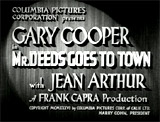
|
Mr. Deeds Goes to Town (1936) Common-sensical yet eccentric tuba player of Mandrake Falls, Vermont, Longfellow Deeds (Gary Gooper), was a poetic writer of greeting cards. When his uncle Martin Semple died, Deeds inherited $20 million, and was brought to New York City by one of his relative's lawyers, and immediately targeted by opportunistic city slickers. Reporter Babe Bennett (Jean Arthur) posed as a 'damsel in distress' to get his attention and the latest tabloid scoops when they became friends, while Deeds (who was falling in love with Babe) was unaware of the press coverage. Crazily, Deeds decided to give away his entire inheritance by buying farmland, and giving plots (and a horse) to every unemployed person. Because of the harebrained scheme, Deeds was taken to court by sleazy lawyers for a competency hearing, to determine his sanity - and possibly separate him from his money. Verdict: In the hilarious hearing, witnesses testified about Deeds' unusual and peculiar behavior - two Faulkner sisters from Mandrake Falls, Amy and Jane (Margaret McWade and Margaret Seddon), claimed that Deeds was often "pixilated" (drunk?), and doodling German psychologist Dr. Emile Von Hallor (Gustav von Seyffertitz) stated that Deeds was manic-depressive. Eventually, love interest Babe came to Deeds' defense, stirring Deeds to take the stand and defend himself. He argued that he was no crazier than any of the others in the courtroom, and that there was nothing wrong with his philanthropic wishes. The judge ruled that Deeds was indeed sane, and he was triumphantly carried out by the crowd. |

|
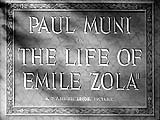
|
The Life of Emile Zola (1937) The actual trial involving Emile Zola (Paul Muni), a celebrated French writer and social critic, occurred in February 1898. He had been defending and fighting for the pardon of French military officer Capt. Alfred Dreyfus (Joseph Schildkraut), a Jewish officer in the French army who was wrongly-accused (and unjustly court-martialed) on the charge of treason for providing secret information to the Germans - he was sentenced to a slow death by life imprisonment on Devil's Island. When new information came to light about Dreyfus' innocence and it appeared to be a cover-up, Zola risked his own life and fame by agreeing to defend Dreyfus. [The real criminal, French major Count Esterhazy, had divulged French military secrets to the Germans, but was found innocent in a rigged court martial hearing.] Zola published his famous "I Accuse" letter to directly accuse the French military of ignoring Dreyfus' innocence and falsely convicting him to protect Esterhazy's guilt. Zola was charged with criminal libel. The trial was a farce - Zola was bullied and discredited while crucial evidence was neglected and false claims were made, even though Zola made strong emotional and personal pleas (Zola's final address to the jury in the film was taken from "I Accuse," not from the actual trial). Verdict: Zola was convicted and sentenced to a year in prison. However, Zola's conviction was overturned on appeal, although he had already fled to London. Zola was never imprisoned. He returned to Paris, France after 18 months in exile, and died an accidental death in 1902 (carbon monoxide poisoning), before the courts fully exonerated Dreyfus in 1906. (Dreyfus was tried a second time, and again convicted and sentenced to 10 years in prison, but quickly pardoned by the French Republic President, and restored to his army rank). |

|
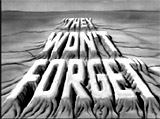
|
They Won't Forget (1937) The setting for this liberal outrage film was the small (fictional) Southern town of Flodden, Georgia in the 1920s, where townsfolk (especially Civil War veterans) were preparing for the annual Confederate Memorial Day parade. The film opened with the murder of Buxton Business College student Mary Clay (this was the debut film of Lana Turner - a bit part including her famous tight-sweater walk), whose body was found by black janitor Tump Redwine (Clinton Rosemond) in the school's basement. Present close to the murder scene were Mary's shorthand teacher Robert Perry Hale (Edward Norris) - an unhappily-transplanted Yankee Northerner, the frightened Redwine, and Dean Buxton (E. Alyn Warren). Ambitious D.A. Andy Griffin (Claude Rains) saw the case as his ticket to the Senate - and he immediately suspected Hale, who was arrested. Detective Pindar (Granville Bates) was assigned to investigate, while weak defense attorney Michael Gleason (Otto Kruger) was selected to defend Hale, who was viciously subjected to anti-northern prejudice, local anger and hate, fueled by reporter Bill Brock (Allyn Joslyn) and Mary's vengeful redneck brothers who wanted a lynching. [The story was directly based on the notoriously lawless Leo Frank lynching in Marietta, Georgia in 1915 after the murder of Mary Phagan.] Verdict: During the trial - a gross miscarriage of justice with many instances of perjury, the histrionic Griffin basically presented 'circumstantial evidence' to vilify Hale as the guilty one: (1) there was blood on Hale's coat (Hale claimed it was from a shave on Main St., although the barber lied and denied it), (2) the unfortunate fact that Hale was planning to quit and leave town at the time of the murder. Hale took the stand and pleaded his innocence, but was not cross-examined. The jury swiftly brought a guilty verdict (although one juror wavered briefly), affirmed by the Supreme Court, although Governor Mountford (Paul Everton) commuted the death sentence to life imprisonment. The train carrying Hale to prison was stopped by a lynch mob (led by the Clay brothers) - and Hale was hanged. Hale's guilt or innocence was never clarified. |

|
On Trial (1939) This B-picture courtroom drama (mostly told in flashback), previously filmed twice before in 1917 (a silent version) and 1928 (a lost film), was one of the earliest courtroom dramas to follow a trial from start to finish. Young businessman Robert Strickland (John Litel) was charged with the murder of wealthy businessman-colleague Gerald Trask (James Stephenson). On the day of the death, Strickland had repaid a debt to Trask of $20,000 and was found in Trask's library with a gun in his hand, standing over the dead body and presumably committing a burglary. Strickland's wife Mae (Margaret Lindsay) disappeared at the same time. Strickland was to be defended by young and inexperienced attorney Arbuckle (Edward Norris), while the DA prosecutor was Gray (William Davidson) - presided over by a judge (Earl Dwire). Strickland was ready to offer no defense and to plead guilty (when it was fairly certain that he had shot Trask: "Your Honor, there's no sense in going on with this trial. I confess and I'm willing to take the consequences"), so the ambitious lawyer Arbuckle took the strategy to prove Strickland's motivations to murder Trask were justified. DA Gray surmised that Strickland was in Trask's library to steal back the repayment money from a wall safe. There were two witnesses to the shooting-murder in the library: Mrs. Joan Trask (Nedda Harrigan) and Trask's secretary Mr. Glover (Larry Williams). Widowed Mrs. Trask testified that before the murder, she had seen Glover depositing money in the safe. During his testimony, Glover asserted that he struck Strickland with a cane, and found the wall-safe combination in Strickland's pocket (that Strickland was attempting to tear up). Later in testimony by Dr. Morgan (Gordon Hart) who had examined Strickland's arm just after the shooting, he confirmed that Strickland had been incapacitated (contrary to Glover's assertions). When Strickland's 5 year-old daughter Doris (Janet Chapman) was called to the stand - her testimony revealed that Strickland's distressed and tormented wife Mae Strickland had been forced to conceal an affair she had been having with the womanizing Trask. When Strickland found out, he rushed out of the house with a gun to kill Trask. In dramatic testimony when she appeared in the courtroom, Mae stated that she had been in an affair with Trask before her marriage to Strickland. At the time of the debt repayment, Trask was threatening to reveal the affair with Mae - he had been blackmailing her into continuing the illicit affair with threats of ruining Robert's business. Strickland's alleged motive to kill Trask was to protect and avenge his wife Mae's besmirched honor, not robbery. Mae was ready to take the blame for Trask's murder. The jurors appeared to sympathetically side with the Stricklands. Verdict: Glover was caught in lies when Dr. Morgan's testimony was read back to him - he admitted to stealing the $20,000 from the wall safe that Strickland had brought to the house, but did not confess to murdering Trask. Strickland was judged to be not guilty, although he probably had committed murder - for suitably vengeful reasons. |
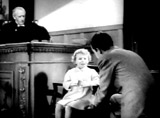
|
|
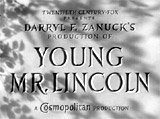
|
Young Mr. Lincoln (1939) The new state capital of Springfield, Illinois was also the location of the new law office of prominent young lawyer Abraham Lincoln (Henry Fonda), who was also recently elected to the state's legislature. His folktale attributes were emphasized at Independence Day celebrations: with log-splitting, and pie-eating judging, etc. During the tug-of-war contest, Scrub White (Fred Kohler, Jr.) and John Palmer Cass (Ward Bond) pestered young Sarah Clay (Arleen Whelan) - her husband Matt Clay (Richard Cromwell) and her brother-in-law Adam Clay (Eddie Quillan) intervened and they soon stopped. But later that night, drunken bully White confronted the two brothers Matt and Adam. During their brawl, White drew his gun and it fired. Cass appeared from the darkness, and claimed White was dead on the ground - not from a single gunshot, but from a knife that Cass had pulled from his heart. Cass claimed that he saw the killing in the "moon-bright" light. Lincoln became involved in the defense of the two farmers accused of murder. Mrs. Abigail Clay (Alice Brady) saw the struggle, but wouldn't talk about it, even when her two boys were arrested for manslaughter. Both were determined to take the blame, trying to spare each other from hanging. Lincoln was able to convince an angry lynch mob to disperse from the jail. He argued that he needed this first case as an up-and-coming lawyer. Verdict: During the trial, the case was prosecuted by John Felder (Donald Meek). Lincoln argued that the defendants acted in self-defense when they saw White with a gun. Cass ultimately testified that he saw Matt kill White - at nighttime in the moonlight when he was about 100 yards away. As Cass was leaving the witness stand area, Lincoln asked Cass what he had against Scrub White. Lincoln produced a Farmer's Almanac, proving on page 12 that Cass' story was a lie. The almanac stated that the moon had set 40 minutes before White was killed, making it pitch-black at the time of the murder. Lincoln coerced a confession from Cass that he had lied - Cass admitted that he had killed White with Matt's dropped knife (when he came upon the scene and saw that White was unhurt): "I didn't mean to kill him!" Cass was trying to frame one of the Clays. Matt and Adam were released from jail. |
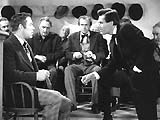 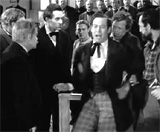
|